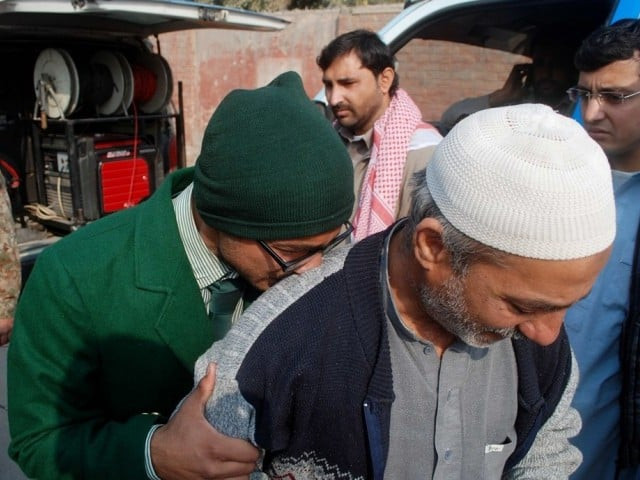Not in the short term: Govt quietly dilutes its counter-terrorism plan
Action against banned outfits, reform of madrassas, repatriation of Afghan refugees bumped off implementation process

A student cries on a man's shoulder, after he was rescued from the Army Public School that was attacked by Taliban gunmen in Peshawar, December 16, 2014. PHOTO: REUTERS
Federal authorities have watered down their counter-terrorism strategy after quietly excluding from the implementation process three key points in the National Action Plan (NAP), a senior official told The Express Tribune on Saturday. These points are action against proscribed outfits, reform of madrassas (religious seminaries) and the repatriation of Afghan refugees.
The NAP was crafted following the December 16, 2014 deadly Taliban assault on the Army Public School in Peshawar that killed over 150 students and staff. As per the plan, the burden would be shifted to the provinces including countering the menace of terrorism, the official said. Yet, despite incidents of terrorism and sectarian clashes, provincial authorities have failed to devise any framework to counter the perpetrators.
Punjab remains the hub for most of these groups. The provincial authorities are considering person-specific laws to bar or discourage individuals from taking part in any activity using the name of any changed platform.
Hamid Ali Khan, national coordinator for the National Counter Terrorism Authority (Nacta), confirmed that the three points are “no more under consideration of Nacta” as these are time-consuming issues that require long-term planning. But the remaining 17 points are being vigorously pursued as they are a key part of NAP.
Earlier, there were assurances in the counter terrorism strategy that ‘defunct’ outfits will not be allowed to operate under any other name. On this count though, the head of Nacta confessed failure and said that no fresh action has been taken against any proscribed organisation and neither has any mechanism been adopted to keep any eye on activities of groups working with changed names.
Experts cite absence of any practical mechanism as the reason behind this failure. An expert who was also a part of government’s experts group told The Express Tribune that the provinces had failed to devise any practical procedure to achieve these goals.
Similarly, point no 10 of the plan reads “registration and regulation of religious seminaries.” The government had not moved forward in this regard, other than a few symbolic actions, the official said.
Goal number 19 incorporated in the draft of the NAP assures of the “formulation of a comprehensive policy to deal with the issue of Afghan refugees, beginning with registration of all refugees”. Sources said that the interior ministry was yet to devise any viable strategy for repatriation of Afghan refugees to their native country. They added that despite the current hype in the media about their return, the ministry had not issued any policy notification for the purpose.
Officials pointed out that huge numbers of CNICs had been issued to these refugees during military rule of Pervez Musharraf. Another challenging task is to create a liaison between National Database and Registration Authority (NADRA) and the United Nations High Commissioner for Refugees (UNHCR) to determine accurate data. Pakistan is also expecting funding from international donors. The Ministry of States and Frontier Regions (SAFRON) has been given the task to work on these aspects.
This is a lengthy process, according to the counter terrorism body’s chief, and one that is hard to monitor regularly.
Seven other ambitious goals identified by the officials include action against elements spreading sectarianism, leaving no room for extremism in any part of the country and taking concrete measures against promotion of terrorism through the internet and social media. Also listed are administrative and development reforms in Fata. The goals include freezing all funding sources of terrorists and terrorist outfits, and working on political reconciliation in Balochistan.
Published in The Express Tribune, March 8th, 2015.



















COMMENTS
Comments are moderated and generally will be posted if they are on-topic and not abusive.
For more information, please see our Comments FAQ